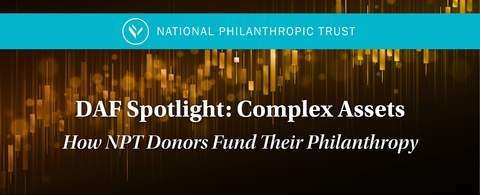JENKINTOWN, Pa.--(BUSINESS WIRE)--A new spotlight report from National Philanthropic Trust (NPT), the largest national, independent public charity that manages donor-advised funds (DAF), details that on average, over the past five years, noncash assets accounted for more than half of total contributions to NPT DAFs. Donors funded grants from NPT DAFs with the liquidation proceeds from noncash assets, including publicly traded securities, real estate, shares of privately held companies, cryptocurrency, jewelry, and collectibles/antiques.
Donor-Advised Fund Spotlight: How Donors Fund Their Philanthropy is the most comprehensive review of complex asset contributions and the due diligence required to potentially convert a donation into charitable funding. The Spotlight analyzed NPT contributions by three asset types: cash, publicly traded securities, and complex assets, the latter two “noncash.”
“More than ever, donors are looking beyond their checking accounts for ways to support their favorite organizations and causes,” said Eileen Heisman, CEO of National Philanthropic Trust. “Complex assets have become a growing funding source for donor-recommended DAF grantmaking. We developed this Spotlight report to demystify DAF donor contribution options, the due diligence involved in contributing a complex asset to a DAF, and review some donor motivations. NPT donors have supported more than a hundred thousand charities in the last five years, in part due to complex asset contributions.”
DAF Spotlight details (NPT DAFs, Fiscal Year 2017 to 2021 Average):
- Noncash assets have been the majority contribution asset type
- Publicly traded securities have been the most common type of asset contributions, followed by cash and complex assets
- Grantmaking dollars increased in total more than 700% over the past five years
The Spotlight provides an overview of the lifecycle of a noncash asset contribution and three-sentence case studies of noncash assets NPT has vetted and ultimately accepted or declined. NPT has accepted contributions from donors to fund DAF grantmaking that include a commercial building in the Midwest, restricted stock from an athleisure wear company, an original modernist oil painting, antique furniture, and cryptocurrency. All contributions to DAFs are irrevocable and must be used for charitable purposes. Donors cannot receive any personal benefit beyond incidental.
“When the stock market rises or cryptocurrencies appreciate rapidly, we see more frequent and larger contributions of the assets,” said Heisman. “There are also always individual circumstances such as retirements, inheritances, or selling of companies that motivate a donor to add to or create a DAF. What always remains consistent is donors’ commitment to addressing existing and future challenges through generous, reliable DAF grantmaking.”
Donor-Advised Fund Spotlight: How Donors Fund Their Philanthropy is published as a public service and available at no charge or login requirement here. Credit: National Philanthropic Trust.
About National Philanthropic Trust
Founded in 1996, National Philanthropic Trust (NPT) marked its 25th Anniversary in 2021 as the largest national, independent public charity that manages donor-advised funds and one of the leading grantmaking institutions in the U.S. Since its founding, NPT has raised more than $38.9 billion in charitable funding and has made more than 492,000 grants exceeding $17.5 billion to nonprofits around the world. NPT annually publishes the Donor-Advised Fund Report, the sector’s authority on the state of DAF philanthropy. Visit NPT’s resource library to learn what you can do with a DAF and about NPT’s impact investing solutions and funding your DAF with noncash assets. More at NPTrust.org and NPTGivingPoint.org.




